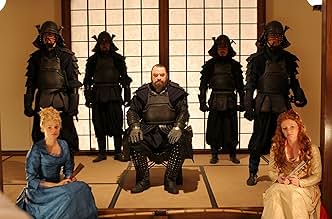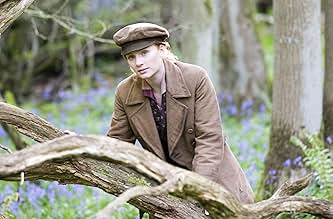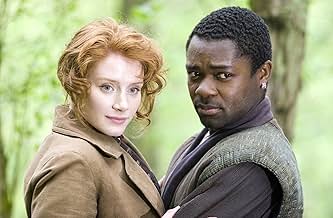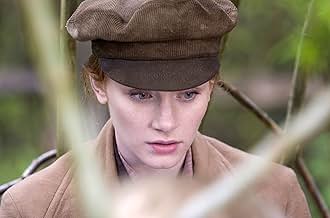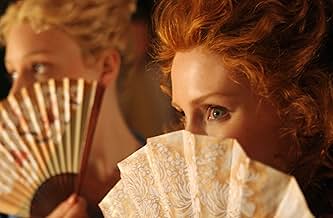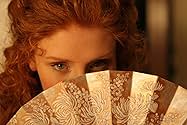VALUTAZIONE IMDb
6,0/10
3945
LA TUA VALUTAZIONE
La figlia del potente Duca deve mostrare il suo coraggio e la sua inventiva per stare con l'uomo che ama.La figlia del potente Duca deve mostrare il suo coraggio e la sua inventiva per stare con l'uomo che ama.La figlia del potente Duca deve mostrare il suo coraggio e la sua inventiva per stare con l'uomo che ama.
- Regia
- Sceneggiatura
- Star
- Premi
- 1 vittoria e 6 candidature totali
Nobuyuki Takano
- Charles
- (as Nobuyuki "Daishi" Takano)
Recensioni in evidenza
An overthrown local monarch takes to the woods with a handful of loyal followers. His daughter also flees also, at a different time, following her true love (but dressed as a man). Only in Shakespeare do fathers/brothers/lovers not recognize each other because they're in different clothes.
Kenneth Branagh is good. He's very good. In fact, he's darn good. But he's not as good as he thinks.
He made a slight shift in locations for "Much Ado About Nothing" and it worked better than he could have hoped. He set Hamlet in a Ruritanian Denmark. Fine. I enjoyed it (helped along, I think, by the fact that I was just coming down with flu in 1996 and during the movie show my temperature shot up to 103).
But setting "As You Like It" in Japan was a risk. It also may be the only version some people ever see, which is a perversion. Whether it works is, of course, subjective. The movie's not bad but downbeat for a comedy. See it and make up your own mind.
(Fortunately, in "The Shakespeare Plays," comedies came out best, and the more conventional "As You Like It" with Helen Mirren is still wonderful, as is the Jacobean-set "Twelfth Night" with Felicity Kendall and the "Much Ado" with Cherie Lunghi; so anyone wanting more Shakespearean interpretations of these Shakespeare plays have those to fall back on. Get a region-free dvd/blu-ray player, if necessary.)
This version has Branagh's typical mix of his stock company (Brian Blessed, Richard Briars) and currently popular stars given a chance to display their acting chops. Some work better than others. In previous efforts Denzell Washington and Charlton Heston came off well; Keenu Reeves and Jack Lemmon, less so.
Shakespeare grew up near the forest of Arden and no doubt played there (as I did in a huge woods I grew up adjacent to) and remembered it in his manhood as a mystical place (as I do mine). He embued it with wonder, so much so the eggheads insist it's not that forest of Arden where "As You Like It" took place but in another of the same name. What was I saying about fathers and lovers not recognizing loved ones in different clothes? It's the same sort of thing.
I wished Branagh had made more Shakespeare in the 1990s when it was popular; but now I'm not so sure. Of course, funding is always a problem.
This version of "As You Like It" has one serious lack: Branagh himself. I like seeing him around but he remains behind the camera. I never wanted "Henry V," "Much Ado," and "Hamlet" to end. I watched the clock on this one.
But this version has a nice surprise ending. Stick around.
Kenneth Branagh is good. He's very good. In fact, he's darn good. But he's not as good as he thinks.
He made a slight shift in locations for "Much Ado About Nothing" and it worked better than he could have hoped. He set Hamlet in a Ruritanian Denmark. Fine. I enjoyed it (helped along, I think, by the fact that I was just coming down with flu in 1996 and during the movie show my temperature shot up to 103).
But setting "As You Like It" in Japan was a risk. It also may be the only version some people ever see, which is a perversion. Whether it works is, of course, subjective. The movie's not bad but downbeat for a comedy. See it and make up your own mind.
(Fortunately, in "The Shakespeare Plays," comedies came out best, and the more conventional "As You Like It" with Helen Mirren is still wonderful, as is the Jacobean-set "Twelfth Night" with Felicity Kendall and the "Much Ado" with Cherie Lunghi; so anyone wanting more Shakespearean interpretations of these Shakespeare plays have those to fall back on. Get a region-free dvd/blu-ray player, if necessary.)
This version has Branagh's typical mix of his stock company (Brian Blessed, Richard Briars) and currently popular stars given a chance to display their acting chops. Some work better than others. In previous efforts Denzell Washington and Charlton Heston came off well; Keenu Reeves and Jack Lemmon, less so.
Shakespeare grew up near the forest of Arden and no doubt played there (as I did in a huge woods I grew up adjacent to) and remembered it in his manhood as a mystical place (as I do mine). He embued it with wonder, so much so the eggheads insist it's not that forest of Arden where "As You Like It" took place but in another of the same name. What was I saying about fathers and lovers not recognizing loved ones in different clothes? It's the same sort of thing.
I wished Branagh had made more Shakespeare in the 1990s when it was popular; but now I'm not so sure. Of course, funding is always a problem.
This version of "As You Like It" has one serious lack: Branagh himself. I like seeing him around but he remains behind the camera. I never wanted "Henry V," "Much Ado," and "Hamlet" to end. I watched the clock on this one.
But this version has a nice surprise ending. Stick around.
Kenneth Branagh takes the Bard to Japanese setting the time being the late 19th century.As You Like It (2006) tells about Rosalind, the daughter of banished duke.She is raised by his younger brother Frederick, who took over dukedom.She falls for a young man named Orlando, but also she is soon banished by Frederick.Her cousin Celia leaves with her.They go to the forest of Arden, and they take the fool Touchtone with them.And also, Rosalind is disguised as a boy, and she goes by the name of Ganymede, while Celia goes by the name of Aliena.Also Orlando happens to be in the same forest, fleeing the wrath of his older brother.William Shakespeare wrote the original, pastoral comedy, around 1599 or 1600.I read it some time ago.Shakespeare sure knew how to write of love, and it is all well adapted to the screen here.And there are also mighty fine players in this play.Let's start with Bryce Dallas Howard, whose work as a boy is almost as good as her work as a girl.Romola Garai is a real treat as Celia.Brian Blessed is great both as Duke Frederick as he is as Duke Senior.David Oyelowo is terrific as Orlando De Boys.Adrian Lester is very good as his brother Oliver.Richard Briers gives a very fine performance of Adam.Alfred Molina is superb as Touchtone.And so is Janet McTeer as his love interest Audrey.Kevin Kline is brilliant as Jaques.Jade Jefferies is marvelous as Phebe.This may not be the funniest thing I've ever seen, nor was the play the funniest thing I've ever read.Maybe I'm too modern and should think more medievally.But it all works because of the words, and the grand feelings it has to offer.And sure I found myself slightly amused when Phebe went head over heels for Rosalind/Ganymede.Branagh shows us that Shakespeare works also in a new environment, in a new era.
Seeing As You Like It, William Shakespeare's romantic comedy of mistaken identity brought back memories of an amateur production of the Carousel Theater here in Vancouver many years ago in which my son David played a small role. It was a wonderful presentation that thoroughly captured the genius of Shakespeare's delightful imagination. Unfortunately, the new filmed version by Kenneth Branagh with its big budget and professional cast is not in the least bit as convincing or entertaining. It is miscast, over produced, over acted, and simplistic with its multi-layered plot made easier to follow than Sesame Street.
Set in Japan in the 19th Century after the country was opened to the West as a trading partner, the royalty of England have been reinvented as wealthy merchants living on the Japanese seacoast. Neither the opulent backgrounds nor the conceit of the script, however, has any impact on either understanding or enjoyment of the play and the setting seems to be simply a marketing decision not an artistic one. The film opens with a kabuki scene at the court of Duke Senior (Brian Blessed). His brother Frederick, also played by Blessed with black hair, interrupts the proceedings to forcibly overthrow his brother's dukedom and the elder Duke is banished to the Arden Forest. Orlando, played by the Nigerian born David Oyelowo, and his brother Oliver (Adrian Lester) then proceed to fight over their position in the court.
Oliver, aligned with Frederick, entices his brother to take on a 300-pound sumo wrestler to all but certain doom but, as the script will have it, the underdog prevails in spite of a weight differential of about 150 pounds. In addition to being victorious at sport, he also falls for one of his well-wishers, the attractive Rosalind (Bryce Dallas Howard), daughter of Duke Senior. Fearful of her safety at the court, Rosalind, pretending to be a man and, taking the name of Ganymede from the handsome cup bearer to the Gods in Greek mythology, sneaks out with her cousin Celia (Romola Garai) and the clown Touchstone (Alfred Molina) to seek out her father in the Forest of Arden. Soon they are joined by Orlando who also fears for his life after a fight with his brother Oliver over their inheritance.
Before long, a bunch of other personages wander into the film including a melancholy philosopher named Jaques (Kevin Kline) who is described as "an exiled courtier", a young shepherd Silvius (Alex Wyndham) who pursues his reluctant girlfriend Phebe (Jade Jefferies), and others. Curiously, there are two characters named Jaques and two named Oliver, something that most writers would go to any length to avoid. The play is best noted for the cynical soliloquy chronicling the seven ages of man, "All the world's a stage and all the men and women merely players: They have their exits and their entrances, and one man in his time plays many parts", delivered with properly dour expression by Kline.
It would not be a Shakespearean comedy without some gender confusion and Rosalind, after noticing Orlando's love poems neatly positioned on trees all over their neck of the woods, knows that Orlando loves her. Approaching Orlando in her boy disguise as Ganymede, Rosalind endeavors to teach him the finer points of courtship if he would just pretend that he is a she. She uses her charm to seduce Orlando, but also is drawn reluctantly into a relationship with the shepherdess Phebe. In Elizabethan conventions, this meant that a boy playing the girl Rosalind would dress as a boy and then be wooed by another boy playing Phebe.
Quite naturally, this being a comedy and all, everyone ends up happy, (dramatized in a finale of the utmost silliness by Branagh) except for Jaques who, in character, decides not to return to the court. All the pieces are in place for the film to be successful but there are key elements that work against it. For the play to work at all, Rosalind has to be believable as a young man. If she is not, Orlando looks like a complete fool, and the play is robbed of its intended homoerotic playfulness. In this case, Branagh does not even attempt to have Rosalind look masculine and the scenes with Orlando in which he/she is teaching him how to express his love are unconvincing (unless you read it that Orlando goes along with the ruse and the author is simply making a statement about role playing, the masks people wear (himself?) in life, and the inauthenticity of self).
Rosalind is supposed to be pure, innocent, perhaps a little naïve but definitely virtuous. Howard, however, is very un-maiden like in appearance and manner and lacks any noticeable chemistry with her lover. She tries so hard to put the correct inflections in the words that she robs them of whatever poetry they might have had, conveying the impression that she is trying out eagerly for a grammar school play. This is Branagh's fifth attempt to put Shakespeare on film and I'm sure it won't be his last. After achieving considerable artistic but not financial success with the first three, he has opted in this latest film for less of an artistic statement than an overtly commercial approach. Love's Labours Lost was an unmitigated disaster scorched by the critics and shunned by audiences. Unfortunately, As You Like It may follow in its path.
Set in Japan in the 19th Century after the country was opened to the West as a trading partner, the royalty of England have been reinvented as wealthy merchants living on the Japanese seacoast. Neither the opulent backgrounds nor the conceit of the script, however, has any impact on either understanding or enjoyment of the play and the setting seems to be simply a marketing decision not an artistic one. The film opens with a kabuki scene at the court of Duke Senior (Brian Blessed). His brother Frederick, also played by Blessed with black hair, interrupts the proceedings to forcibly overthrow his brother's dukedom and the elder Duke is banished to the Arden Forest. Orlando, played by the Nigerian born David Oyelowo, and his brother Oliver (Adrian Lester) then proceed to fight over their position in the court.
Oliver, aligned with Frederick, entices his brother to take on a 300-pound sumo wrestler to all but certain doom but, as the script will have it, the underdog prevails in spite of a weight differential of about 150 pounds. In addition to being victorious at sport, he also falls for one of his well-wishers, the attractive Rosalind (Bryce Dallas Howard), daughter of Duke Senior. Fearful of her safety at the court, Rosalind, pretending to be a man and, taking the name of Ganymede from the handsome cup bearer to the Gods in Greek mythology, sneaks out with her cousin Celia (Romola Garai) and the clown Touchstone (Alfred Molina) to seek out her father in the Forest of Arden. Soon they are joined by Orlando who also fears for his life after a fight with his brother Oliver over their inheritance.
Before long, a bunch of other personages wander into the film including a melancholy philosopher named Jaques (Kevin Kline) who is described as "an exiled courtier", a young shepherd Silvius (Alex Wyndham) who pursues his reluctant girlfriend Phebe (Jade Jefferies), and others. Curiously, there are two characters named Jaques and two named Oliver, something that most writers would go to any length to avoid. The play is best noted for the cynical soliloquy chronicling the seven ages of man, "All the world's a stage and all the men and women merely players: They have their exits and their entrances, and one man in his time plays many parts", delivered with properly dour expression by Kline.
It would not be a Shakespearean comedy without some gender confusion and Rosalind, after noticing Orlando's love poems neatly positioned on trees all over their neck of the woods, knows that Orlando loves her. Approaching Orlando in her boy disguise as Ganymede, Rosalind endeavors to teach him the finer points of courtship if he would just pretend that he is a she. She uses her charm to seduce Orlando, but also is drawn reluctantly into a relationship with the shepherdess Phebe. In Elizabethan conventions, this meant that a boy playing the girl Rosalind would dress as a boy and then be wooed by another boy playing Phebe.
Quite naturally, this being a comedy and all, everyone ends up happy, (dramatized in a finale of the utmost silliness by Branagh) except for Jaques who, in character, decides not to return to the court. All the pieces are in place for the film to be successful but there are key elements that work against it. For the play to work at all, Rosalind has to be believable as a young man. If she is not, Orlando looks like a complete fool, and the play is robbed of its intended homoerotic playfulness. In this case, Branagh does not even attempt to have Rosalind look masculine and the scenes with Orlando in which he/she is teaching him how to express his love are unconvincing (unless you read it that Orlando goes along with the ruse and the author is simply making a statement about role playing, the masks people wear (himself?) in life, and the inauthenticity of self).
Rosalind is supposed to be pure, innocent, perhaps a little naïve but definitely virtuous. Howard, however, is very un-maiden like in appearance and manner and lacks any noticeable chemistry with her lover. She tries so hard to put the correct inflections in the words that she robs them of whatever poetry they might have had, conveying the impression that she is trying out eagerly for a grammar school play. This is Branagh's fifth attempt to put Shakespeare on film and I'm sure it won't be his last. After achieving considerable artistic but not financial success with the first three, he has opted in this latest film for less of an artistic statement than an overtly commercial approach. Love's Labours Lost was an unmitigated disaster scorched by the critics and shunned by audiences. Unfortunately, As You Like It may follow in its path.
Kenneth Branagh seems to get a fair bit of stick in some places, and I'm never quite sure why. Whether it's because he picks unfashionable projects to direct or star in, or because he comes across as a theatrical English "luvvy", I don't know. But for me, his lonely (almost solitary) championing of modern big screen Shakespeare adaptations has always been cause for celebration. Time and again he has sought to make the bard's literature not only appealing and comprehensible to the audience of today, but also relevant - to show that Shakespeare has always got something to say about society and people. If nothing else, English teachers worldwide must be relieved there are alternatives to showing kids the more archaic Olivier golden oldies.
His latest adaptation, As You Like It, is no exception. For those unfamiliar with the play, it's basically a romantic comedy, with a bit of political drama thrown in for good measure. Here the action is relocated from Middle Ages France to 19th century Japan (stay with me), when the country was being opened up to the West. A small group of Western settlers have more or less set up their own private kingdom here. You can find a detailed plot synopsis elsewhere on the web I'm certain, but I'll try and summarise it anyway: Rosalind (Bryce Dallas Howard) is the daughter of Duke Senior (Brian Blessed, with long white hair), who is usurped by his own treacherous brother, Duke Frederick (Blessed again, with dark hair this time, doing the usurping in a neat wordless sequence). Senior is exiled to the forest with his followers, while Rosalind is forced to remain and keep Frederick's daughter Celia (Romola Garai) company. Frederick becomes paranoid though, and banishes Rosalind as well shortly afterwards. Celia, best friends with Rosalind, decides to accompany her; naturally, both are forced to disguise themselves, which causes complications when the one Rosalind loves, Orlando (David Oyelowo), declares his undying love for her.
Bright, breezy and instantly accessible, Branagh has come up trumps. Staying behind the camera this time out, the cast is led by Bryce Dallas Howard, in a performance that will surely (if there is any justice in the world) attract awards attention. The part of Rosalind is one of the most popular and sought after female roles in all of Shakespeare. She is sweet and kind, but not simpering - she's quite decisive too. She is the dynamic behind the play's actions, and Howard seizes the role with everything she's got. The supporting cast are uniformly excellent too - the legend that is Brian Blessed is always great value, and he does well here in his dual role, particularly the evil Frederick. David Oyelowo is also excellent, while Alfred Molina is very funny in the comic relief role of Touchstone, the court fool. Look out too for Patrick Doyle, the film composer who provides the score here but also performs on screen in the singing role of Amiens.
Obviously the unique spin on this adaptation is the setting. The play is mostly set in the forest of Arden, so nature is a prominent theme throughout. Branagh highlights this by moving the action to pre-20th century Japan, where beauty and peace can be readily found in nature. The film is gorgeous to look at, not only in the forest settings, but also in the 'court' during the first act's coup d'etat - the sets and costumes look brilliant.
I won't try and argue that this is going to be the best film of 2007, because I'm sure that would be nonsense. The film has faults, although some of these might be attributed to the source material (with which I'm not familiar) - one or two characters seem to disappear halfway through, while Duke Frederick's fate is a cop-out even by Shakespeare's standards. But the important thing is that Branagh has made the play very easy to follow, very humorous and also given it a contemporary edge, as well as making an entertaining film in its own right. And for that, he surely deserves a cheer at least.
I urge anyone to seek the film out, whether you're interested in Shakespeare or not, because it is simply great fun. Here's hoping Mr Branagh continues to get his films funded and made.
His latest adaptation, As You Like It, is no exception. For those unfamiliar with the play, it's basically a romantic comedy, with a bit of political drama thrown in for good measure. Here the action is relocated from Middle Ages France to 19th century Japan (stay with me), when the country was being opened up to the West. A small group of Western settlers have more or less set up their own private kingdom here. You can find a detailed plot synopsis elsewhere on the web I'm certain, but I'll try and summarise it anyway: Rosalind (Bryce Dallas Howard) is the daughter of Duke Senior (Brian Blessed, with long white hair), who is usurped by his own treacherous brother, Duke Frederick (Blessed again, with dark hair this time, doing the usurping in a neat wordless sequence). Senior is exiled to the forest with his followers, while Rosalind is forced to remain and keep Frederick's daughter Celia (Romola Garai) company. Frederick becomes paranoid though, and banishes Rosalind as well shortly afterwards. Celia, best friends with Rosalind, decides to accompany her; naturally, both are forced to disguise themselves, which causes complications when the one Rosalind loves, Orlando (David Oyelowo), declares his undying love for her.
Bright, breezy and instantly accessible, Branagh has come up trumps. Staying behind the camera this time out, the cast is led by Bryce Dallas Howard, in a performance that will surely (if there is any justice in the world) attract awards attention. The part of Rosalind is one of the most popular and sought after female roles in all of Shakespeare. She is sweet and kind, but not simpering - she's quite decisive too. She is the dynamic behind the play's actions, and Howard seizes the role with everything she's got. The supporting cast are uniformly excellent too - the legend that is Brian Blessed is always great value, and he does well here in his dual role, particularly the evil Frederick. David Oyelowo is also excellent, while Alfred Molina is very funny in the comic relief role of Touchstone, the court fool. Look out too for Patrick Doyle, the film composer who provides the score here but also performs on screen in the singing role of Amiens.
Obviously the unique spin on this adaptation is the setting. The play is mostly set in the forest of Arden, so nature is a prominent theme throughout. Branagh highlights this by moving the action to pre-20th century Japan, where beauty and peace can be readily found in nature. The film is gorgeous to look at, not only in the forest settings, but also in the 'court' during the first act's coup d'etat - the sets and costumes look brilliant.
I won't try and argue that this is going to be the best film of 2007, because I'm sure that would be nonsense. The film has faults, although some of these might be attributed to the source material (with which I'm not familiar) - one or two characters seem to disappear halfway through, while Duke Frederick's fate is a cop-out even by Shakespeare's standards. But the important thing is that Branagh has made the play very easy to follow, very humorous and also given it a contemporary edge, as well as making an entertaining film in its own right. And for that, he surely deserves a cheer at least.
I urge anyone to seek the film out, whether you're interested in Shakespeare or not, because it is simply great fun. Here's hoping Mr Branagh continues to get his films funded and made.
On the whole, I agree with the many reviewers before me who praise Kenneth Branagh in general and "As You Like It" in specific. So, I don't have to reiterate their comments here. I am writing to rebut the review by teacher_tom516 who completely misunderstands the movie, the play and the term "suspension of disbelief." Starting with the last, Samuel Taylor Coleridge called it "the willful suspension of disbelief," the tacit agreement made by the audience to leave reality at the door of the theater and accept the production's conceit as a temporary new reality. All theater, with the exception of the mercifully brief 19th century flirtation with "Realism/Naturalism", recognizes that it is an illusion to try to present "reality" on stage. Shakespeare certainly knew that and even tells his audience this in several of his plays (Henry V, Hamlet, The Tempest, A Midsummer Night's Dream, etc etc). His comedies are allegorical -- more subtly, so are his tragedies and even histories. His audiences accepted the premise without caviling over clocks striking in "Julius Caesar" and wild animals from different continents nonchalantly coexist. Shakespeare's Forest of Arden wasn't named for the Belgian Ardennes but taken from Lodge's romance "Rosalynde," from which Shakespeare cribbed his plot and characters. It is a magical place not found on maps -- it is the "Bitter Wood" of Medieval legend, the place where humans must face themselves, with or without Yoda. Arden was also Shakespeare's mother's family name. The writer plays the name game with the characters, seemingly unaware that Shakespeare's names are often chosen for their metaphoric associations. Falstaff is a "false staff" to Prince Hal. Why Orlando? Not because it's an Italian courtier's name, but because it's the Italian translation of Roland, the name of one of two legendary brothers-in-arms in the reign of Charlemagne, immortalized in "The Song of Roland." The other brother-knight's name was... Oliver! Also, It's Jaques, not Jacques, and may have been pronounced "Jakes", Brit slang for bathroom, which might be taken as ironic since he is such a pessimist, unlike his opposite, Touchstone, whose name might be taken as the iconic test of Truth. Do the hodge-podge of names in Hamlet disturb teacher_tom516? Claudius? Polonius? Laertes? Rosencrantz and Guildenstern!?
His biggest complaint is about the Japanese setting. Obviously, he didn't read the opening on-screen explanation Mr. Branagh thoughtfully provided for the edification of anyone interested in it. Is the Meiji Japan of the imagination be any less exotic than the locale of "A Winter's Tale" -- "the coast of Bohemia."? Bohemia doesn't have a coast -- it's completely landlocked. Oh yes, how absurd a scrawny kid could throw a Sumo wrestler? That's the whole point. Ever hear of Jack the Giant-killer? Beware people who confuse the truths of fairy tales with the factoids of spreadsheets. Yes, Shakespeare plays fast and loose with facts - so do creative directors interpreting his plays. As Miguel de Cervantes said, "One should never let facts get in the way of Truth." He also said, "Facts are the enemy of Truth."
His biggest complaint is about the Japanese setting. Obviously, he didn't read the opening on-screen explanation Mr. Branagh thoughtfully provided for the edification of anyone interested in it. Is the Meiji Japan of the imagination be any less exotic than the locale of "A Winter's Tale" -- "the coast of Bohemia."? Bohemia doesn't have a coast -- it's completely landlocked. Oh yes, how absurd a scrawny kid could throw a Sumo wrestler? That's the whole point. Ever hear of Jack the Giant-killer? Beware people who confuse the truths of fairy tales with the factoids of spreadsheets. Yes, Shakespeare plays fast and loose with facts - so do creative directors interpreting his plays. As Miguel de Cervantes said, "One should never let facts get in the way of Truth." He also said, "Facts are the enemy of Truth."
Lo sapevi?
- QuizThis was the ninth and final film directed by Kenneth Branagh in which Richard Briers stars. The others are Enrico V (1989), Gli amici di Peter (1992), Il canto del cigno (1992), Molto rumore per nulla (1993), Frankenstein di Mary Shelley (1994), Nel bel mezzo di un gelido inverno (1995), Hamlet (1996) and Pene d'amor perdute (2000).
- BlooperLions are not native to Japan. The lion is a carryover from the original play, which was set in a generic European country at an indeterminate time in the Middle Ages. Even that didn't make much sense, as lions have been extirpated from the main part of Europe since the 4th century AD, and from the Caucasus since the 10th century. But many Europeans, possibly including William Shakespeare, didn't know that lions weren't around anymore.
- Citazioni
Touchstone: The fool doth think he is wise, but the wise man knows himself to be a fool.
- Curiosità sui creditiThe picture seems to end without the play's Epilogue. Then, the closing credits begin, when they are suddenly interrupted by Bryce Dallas Howard, still in character as Rosalind, who then is seen speaking the Epilogue as she begins to walk to her trailer, drinking a cup of coffee along the way. After the speech, Kenneth Branagh can be heard off-screen saying "Aaaand...cut!" After this, the closing credits resume.
- Versioni alternativeThe version shown on cable television has been formatted to the aspect ratio commonly used in HDTV production (that is, anywhere from 1.78:1 to 1.85:1), while the version released to movie theatres was released in the typical CinemaScope/Panavision aspect ratio (2.39:1). It is the theatrical version which has been issued on DVD. Since the film was made using the Super 35 format, it was possible to make versions of the film in different aspect ratios.
- ConnessioniFeatured in 14th Annual Screen Actors Guild Awards (2008)
- Colonne sonoreUnder the Greenwood Tree
Composed by Patrick Doyle
Lyrics by William Shakespeare
Performed by Patrick Doyle and London Symphony Orchestra
I più visti
Accedi per valutare e creare un elenco di titoli salvati per ottenere consigli personalizzati
- How long is As You Like It?Powered by Alexa
Dettagli
- Data di uscita
- Paesi di origine
- Lingua
- Celebre anche come
- As You Like It
- Luoghi delle riprese
- Aziende produttrici
- Vedi altri crediti dell’azienda su IMDbPro
Botteghino
- Lordo in tutto il mondo
- 563.162 USD
- Tempo di esecuzione2 ore 7 minuti
- Colore
- Mix di suoni
Contribuisci a questa pagina
Suggerisci una modifica o aggiungi i contenuti mancanti

Divario superiore
By what name was Come vi piace (2006) officially released in India in English?
Rispondi



